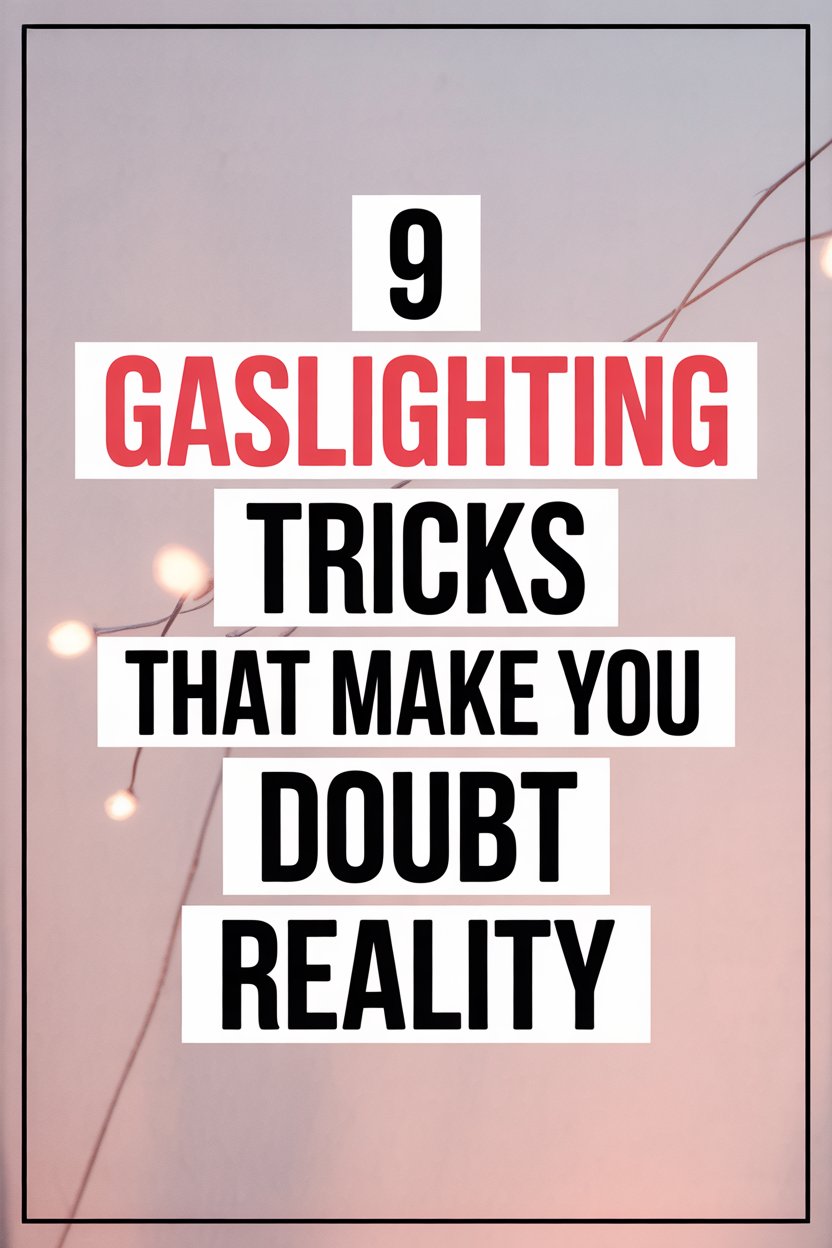Tiny doubts, weird moments, that niggling sense of confusion—gaslighting can sneak up on you like socks in the dryer.
One minute, you’re certain of what you saw or heard. The next, you’re wondering if you should be fitted for a tin-foil hat. Welcome to the emotional funhouse, built by someone who wants you questioning your own mind.
Gaslighting isn’t just a buzzword for spicy internet feuds. It’s an emotional manipulation tactic, and if you’re not careful, it’ll have you second-guessing everything from your memory to your sanity.
Let’s run through nine classic gaslighting tricks, so you can spot that emotional smoke and mirrors before it turns your living room into a psychological circus.
1. The Rewrite of History
Ever found yourself in an argument where suddenly everything you remember happening, well, didn’t? “That’s not what happened,” they declare, as if your memories got swapped out by Netflix screenwriters overnight.
This isn’t just someone disagreeing about which pizza topping you ordered. It’s full-on denial of events that you know occurred.
Over time, this messes with your memory and confidence. Suddenly, you’re apologizing for something that wasn’t your fault—or never happened at all.
What to do: Keep your own receipts. No, not from Target—write down conversations, keep texts or emails, or just jot notes on your phone. When someone tries to rewrite the script, you’ve got a backstage pass to reality.
2. The “You’re Too Sensitive” Shuffle
Raise an issue, get told you’re “overreacting,” “too sensitive,” or “always making a big deal out of nothing.” This is classic gaslighter choreography: trivialize your feelings, then pirouette right out of accountability.
Feelings aren’t math equations—nobody gets to dictate how you should feel except you. If you constantly hear that it’s all in your head, you might start believing it, which is the whole point.
What to do: Stand by your feelings. Trust your gut. No need to turn into an emotional robot just to keep the peace.
3. The Vanishing Act
Details from last week? Disappeared. Promises made? Poof, gone. The gaslighter claims they never said that, never agreed to that, or simply never heard you. Memory loss as a superpower—if only it worked on their parking tickets.
The goal isn’t just to wiggle out of blame. It’s to make you doubt your own recollection until you’re the one apologizing for “misunderstanding” every conversation.
What to do: When commitments or important discussions happen, ask for confirmation—in writing if possible. “Just to make sure we’re on the same page…” works wonders.
No need to turn your life into a contract negotiation, but don’t leave things up to interpretation either.
4. The Blame Game Olympics
Something went wrong? Get ready, because the Gaslight Games are about to begin. No matter what happened, it’s your fault. They’re late? You didn’t remind them. They forgot your anniversary? You should’ve dropped hints.
This tactic keeps you on the defensive, scrambling to fix things that, frankly, are not yours to fix. Over time, it chips away at your self-esteem and makes you feel like a walking disaster zone.
What to do: Notice the pattern. If you’re constantly apologizing for things that aren’t in your control, step back and question who’s holding the rulebook. Spoiler: it isn’t you.
5. The “Joking” Jab
Ah, the old “I was just joking” move. An insult wrapped as banter, topped with a side-eye and a smirk. When you call them on it? “You’re too sensitive” makes a guest appearance, or you’re told, “Lighten up, can’t you take a joke?”
This isn’t stand-up comedy night. These “jokes” often have a sharp sting that sticks around. Being told you’re humorless for feeling hurt? That’s a classic gaslighting encore.
What to do: Call out the pattern. You’re not required to laugh off comments that land like a brick. If it doesn’t feel like a joke, it’s not funny.
6. The Divide and Conquer Routine
Ever had your friends or family suddenly seem distant? Maybe someone’s been whispering half-truths or flat-out lies behind your back, or painting you as “unstable” or “difficult.”
Suddenly, the people who’d usually have your back are side-eyeing you. Gaslighters love this move—it isolates you, making it harder to reach out for support or validation.
What to do: Stay connected to your circle. If you notice any weird vibes, communicate directly. “Hey, I heard this and I wanted to clear it up…” Keep the grapevine in check before it turns into a kudzu infestation.
7. The Straight-Faced Denial
You could be holding a signed confession, a Polaroid, and three witnesses, but the gaslighter will still say, “That never happened.” The level of commitment to the bit is almost admirable—if it weren’t so infuriating.
This relentless denial isn’t about winning arguments. It’s about wearing you down, until you start doubting your own eyes and ears.
What to do: Trust your senses. If you saw it, heard it, or read it, you don’t need to convince anyone else it’s true. You’re not auditioning for CSI: Relationship Edition.
8. The Mood Swing Switcheroo
One minute, sweetness and light. The next, frostier than your ex’s new Instagram. These whiplash-inducing mood swings aren’t just moodiness—they’re designed to keep you off-balance and walking on eggshells.
If you’re always guessing which version of your partner you’ll get, it’s not because you missed the latest weather report. Gaslighters use unpredictability as a control tactic, making you eager (read: desperate) to avoid “setting them off.”
What to do: Don’t blame yourself for their emotional seesaw. Your job is not to be an amateur meteorologist. Set boundaries and notice if the rollercoaster goes one way—your nerves pay the ticket price.
9. The Puppetmaster’s Pity Play
When all else fails, cue the waterworks or the tragic tale. Suddenly, the gaslighter is the real victim. If you try to stand up for yourself, you’re “cruel” or “unfair.”
Next thing you know, you’re comforting the person who just made you question your own sanity.
Empathy is a beautiful thing—until it’s used against you. Gaslighters tug at your heartstrings, not just to get out of trouble, but to flip the script entirely.
What to do: Show compassion without sacrificing your truth. It’s possible to care without falling for the guilt trip. If the pattern repeats, it’s not about one bad day—it’s about control.
When Reality Feels Like a Magic Trick
Gaslighting isn’t always as obvious as a Bond villain twirling a mustache. Sometimes, it’s subtle: a look, a word, a shrug that leaves you second-guessing yourself on the regular.
The goal isn’t just to win arguments—it’s to make you question your own internal compass, until you’re lost in a forest with no map or compass in sight.
If you’re nodding along to more than a few of these tricks, you’re not alone—and you’re certainly not “crazy.” (Insert eye roll at anyone who tries to tell you otherwise.)
Whether it’s a partner, friend, family member, or boss, these are classic moves straight out of the manipulator’s playbook.
Start documenting, trust your gut, and reach for a lifeline. Chat with someone you trust, or even a professional if you need to.
Reality-checks are free, and much healthier than living in a house of mirrors.
Your reality is valid. Your memories, your feelings, your boundaries—all real, all worth defending.
Shine a light on the smoke and mirrors, and watch the magic trick lose its power.


